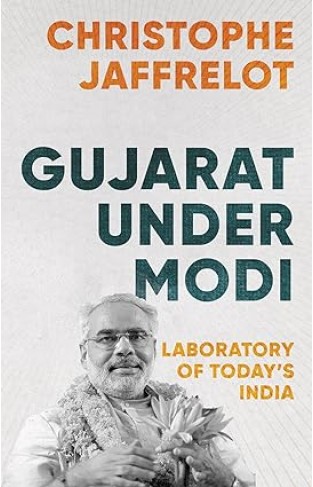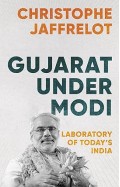Gujarat Under Modi: Laboratory of Today's India
By: Christophe Jaffrelot
-
Rs 7,916.00
- Rs 9,895.00
- 20%
You save Rs 1,979.00.
Due to constant currency fluctuation, prices are subject to change with or without notice.
Gujarat Under Modi: Laboratory of Today's India
By: Christophe Jaffrelot
Rs 7,916.00 Rs 9,895.00 Ex Tax :Rs 7,916.00
Zubin Mehta: A Musical Journey (An Authorized Biography)
By: VOID - Bakhtiar K. Dadabhoy
Rs 630.00 Rs 1,050.00 Ex Tax :Rs 630.00
The Art of Quiet Influence - Timeless Wisdom for Leading Without Authority
By: Jocelyn Davis
Rs 2,795.00 Ex Tax :Rs 2,795.00
Blood and Silk: Power and Conflict in Modern Southeast Asia
By: Michael Vatikiotis
Rs 3,836.00 Rs 4,795.00 Ex Tax :Rs 3,836.00
Walt Disney; Triumph of the American Imagination(Deckle Edge)
By: Neal Gabler
Rs 2,895.00 Ex Tax :Rs 2,895.00
Apple: The inside Story of Intrigue, Egomania, and Business Blunders
By: Jim Carlton
Rs 236.00 Rs 295.00 Ex Tax :Rs 236.00
Top Secret America: The Rise of the New American Security State
By: Dana Priest
Rs 5,806.50 Rs 8,295.00 Ex Tax :Rs 5,806.50
The Origins of Political Order From Prehuman Times to the French RevolutioN
By: Francis Fukuyama
Rs 3,895.00 Ex Tax :Rs 3,895.00
Manning Up: How the Rise of Women Has Turned Men into Boys
By: Kay Hymowitz
Rs 796.00 Rs 995.00 Ex Tax :Rs 796.00
The Obama Syndrome: Surrender At Home War Abroad
By: Tariq Ali
Rs 777.00 Rs 1,295.00 Ex Tax :Rs 777.00
The Quest For Meaning: Developing A Philosophy Of Pluralism
By: Tariq Ramadan
Rs 837.00 Rs 1,395.00 Ex Tax :Rs 837.00
The Pakistan US Conundrum Jihadists The Military And The People The Struggle For Control
By: Yunas Samad
Rs 837.00 Rs 1,395.00 Ex Tax :Rs 837.00
An Enemy We Created: The Myth Of The Taliban Al Qaeda Merger In Afghanistan 19702010
By: Alex Strick van Linschoten
Rs 4,200.00 Rs 5,250.00 Ex Tax :Rs 4,200.00
WikiLeaks: Inside Julian Assanges War on Secrecy
By: David Leigh & Luke Harding
Rs 680.00 Rs 850.00 Ex Tax :Rs 680.00
The Art of Quiet Influence - Timeless Wisdom for Leading Without Authority
By: Jocelyn Davis
Rs 2,795.00 Ex Tax :Rs 2,795.00
Blood and Silk: Power and Conflict in Modern Southeast Asia
By: Michael Vatikiotis
Rs 3,836.00 Rs 4,795.00 Ex Tax :Rs 3,836.00
Walt Disney; Triumph of the American Imagination(Deckle Edge)
By: Neal Gabler
Rs 2,895.00 Ex Tax :Rs 2,895.00
Apple: The inside Story of Intrigue, Egomania, and Business Blunders
By: Jim Carlton
Rs 236.00 Rs 295.00 Ex Tax :Rs 236.00
Top Secret America: The Rise of the New American Security State
By: Dana Priest
Rs 5,806.50 Rs 8,295.00 Ex Tax :Rs 5,806.50
No recently viewed books available at the moment.
Zubin Mehta: A Musical Journey (An Authorized Biography)
By: VOID - Bakhtiar K. Dadabhoy
Rs 630.00 Rs 1,050.00 Ex Tax :Rs 630.00
Gujarat Under Modi: Laboratory of Today's India
By: Christophe Jaffrelot
Rs 7,916.00 Rs 9,895.00 Ex Tax :Rs 7,916.00
The Art of Quiet Influence - Timeless Wisdom for Leading Without Authority
By: Jocelyn Davis
Rs 2,795.00 Ex Tax :Rs 2,795.00
Blood and Silk: Power and Conflict in Modern Southeast Asia
By: Michael Vatikiotis
Rs 3,836.00 Rs 4,795.00 Ex Tax :Rs 3,836.00
Walt Disney; Triumph of the American Imagination(Deckle Edge)
By: Neal Gabler
Rs 2,895.00 Ex Tax :Rs 2,895.00
Apple: The inside Story of Intrigue, Egomania, and Business Blunders
By: Jim Carlton
Rs 236.00 Rs 295.00 Ex Tax :Rs 236.00
Top Secret America: The Rise of the New American Security State
By: Dana Priest
Rs 5,806.50 Rs 8,295.00 Ex Tax :Rs 5,806.50














-120x187.jpg?q6)











-120x187.jpg?q6)



-120x187.jpg?q6)



